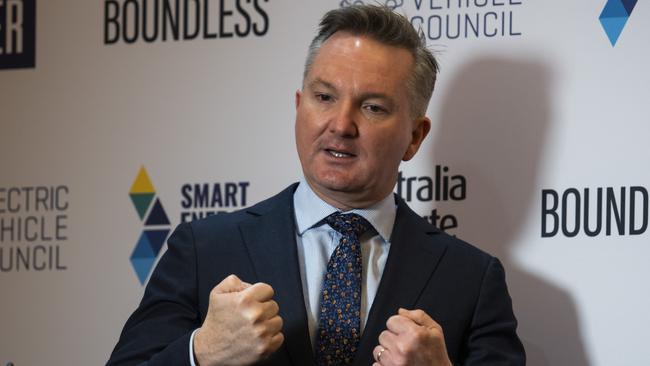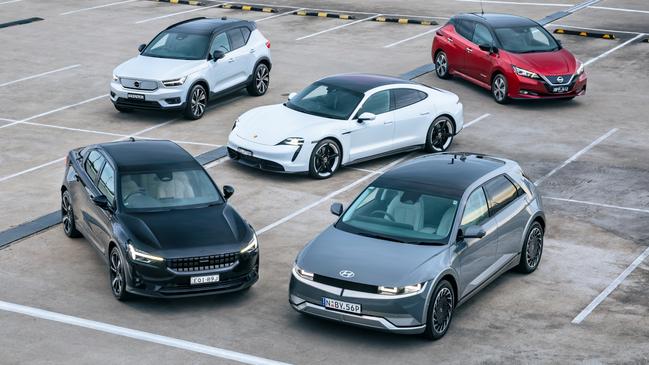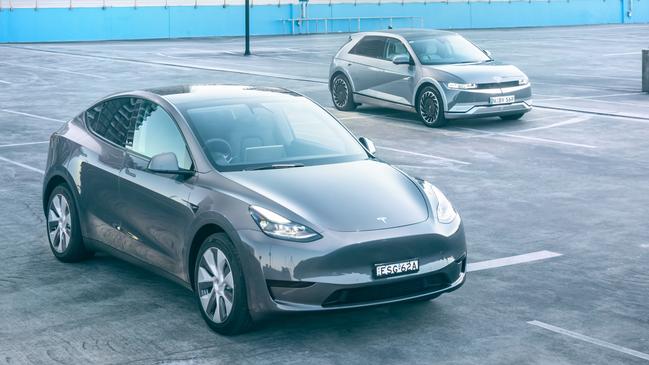Car industry backs Chris Bowen’s move to introduce a CO2 target
A CO2 emissions target for new vehicles will boost Australia’s supply of electric vehicles by signalling to the world to “send the best technologies to Australia”.
Motoring News
Don't miss out on the headlines from Motoring News. Followed categories will be added to My News.
The car industry has welcomed the Federal Government’s plan for an enforceable CO2 emissions target for new vehicles, saying it will give buyers access to a wider range of electric vehicles.
Tony Weber, the head of the Federal Chamber of Automotive Industries, said a target would give the car industry certainty and would improve supply of electric vehicles from overseas.
“You need to send a signal to head offices right around the world to send the best technologies to Australia,” he said.
Climate Change and Energy Minister Chris Bowen announced the government would release a discussion paper for consultation on a national electric vehicle strategy aimed at boosting EV supply in Australia.

Mr Bowen told an EV summit in Canberra a CO2 target with penalties for inefficient vehicles would attract cheaper EVs to the local market.
“After a decade of denial and delay, an era of demonisation of innovation, after years of frustration … we now have a chance to give Australians access to the world’s best transport technology,” he said.
“Serious action on climate change does involve serious action on transport emissions,” he said.
He said a clear CO2 target was “a very good cost of living move”, as it would give Australian motorists “better options” and “more access to cars which will never oblige them to lift a nozzle at a petrol station ever again.”
The government was working with the states to develop a national EV strategy.
“The goal of the strategy is clear: To make EVs more affordable, to drive more choice in the market, to drive EV uptake, to reduce emissions, to save us all money on fuel and to ensure that we’re taking advantage of local manufacturing opportunities.
“We believe now is the time to have a sensible discussion about whether fuel efficiency standards could help improve the supply of electric vehicles into our market to address the cost of living impacts of inefficient cars and reduce emissions from the transport sector.”

Mr Weber said it was important that any government policy address the high price of EVs available in Australia.
The best selling EVs cost north of $70,000 on the road at the moment, putting them out of the reach of most Australians.
“It’s really important that price is addressed. This should not be the preserve of the well-off. It needs to be right across the marketplace so we have choice and range,” Mr Weber said.
He also cautioned against rushing through a CO2 target without industry consultation.
Some EV advocates have called for a tough target from as early as 2024, with a ban on petrol and diesel vehicles from 2035.

Mr Weber rejected calls for a 2035 ban as “primary schoolboy analysis”.
“We need to understand what is possible – the limitations in terms of availability, price, affordability – and also it needs to be supported by infrastructure both in terms of charging points and the capacity of the grid to cope with a substantial expansion of electrification in the marketplace.
“People who suggest major change in the next 18 months simply do not understand how the vehicle industry works. The shortest model cycle is five years and you cannot just reduce your CO2 overnight.
“This debate has been hijacked by people who do not understand the automotive market. That is why we need a long-term strategy,” he said.

Mr Bowen acknowledged concerns about the current cost of EVs.
“There are many consumers who are interested in buying an EV but even if they could access the limited supply they couldn’t afford it,” he said.
That had led to slow sales of EVs.
“Australian sales of electric vehicles are at a rate five times lower than the global average.
“While other jurisdictions such as the United Kingdom are signalling the banning of sales of internal combustion engine cars we run a real risk of becoming even more of a dumping ground for cars that are expensive to run and at the back of the global pack,” he said.
The shadow minister for climate change and energy, Ted O’Brien, has been contacted for comment.
COMMENT: Don’t hold your breath for change
Originally published as Car industry backs Chris Bowen’s move to introduce a CO2 target





